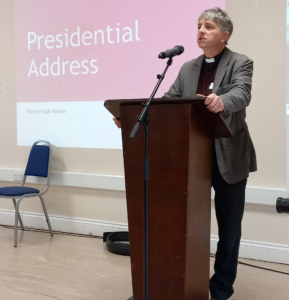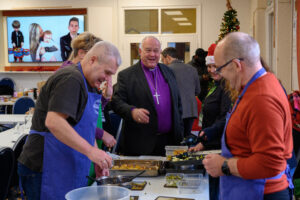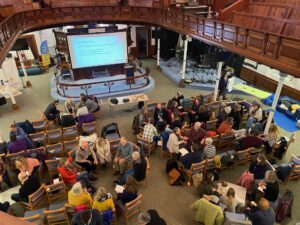Hope in the storm
Bishop Hugh Nelson’s Presidential Address to Diocesan Synod on February 1, 2025
You all know the story of Jesus and the storm. How he gets into a boat with his disciples and falls asleep, and how a great storm starts to blow so that the boat is about to sink, and how Jesus sleeps on, oblivious to the danger. And how his disciples shake him awake saying ‘don’t you care that we’re dying?’ And how Jesus calms the crazy storm, asks them why they were afraid and invites them to put their hope in him again.
 In Matthew’s gospel, the Greek words translated ‘great storm’ are ‘seismos megas’, which gives us the words ‘seismic’, as in an earthquake, and ‘mega’ – as in anything that’s big beyond our imagining. This storm wasn’t just an amber weather warning – like the ones we seem to get now whenever there’s the hint of a puff of wind.This was a great shaking of the foundations of the sea and sky. A great seismic event that turned what made sense upside down.
In Matthew’s gospel, the Greek words translated ‘great storm’ are ‘seismos megas’, which gives us the words ‘seismic’, as in an earthquake, and ‘mega’ – as in anything that’s big beyond our imagining. This storm wasn’t just an amber weather warning – like the ones we seem to get now whenever there’s the hint of a puff of wind.This was a great shaking of the foundations of the sea and sky. A great seismic event that turned what made sense upside down.
And in the midst of this trauma the invitation that Jesus makes is to stick close to him and to have confidence in his presence. The invitation to the disciples is to put their hope in him.
The Church of England nationally faces challenges
The Church of England nationally faces challenges, some of which are seismic – a very shaking of the foundations of what we had thought was reliable.
To switch metaphor for a moment, I have had an image for a while of the church nationally – I’m not talking here about our parishes or this diocese, but the Church as a national thing. The picture is of the Church of England as a stately home. At first glance it all looks very grand, but if you look closely you can see that it’s a bit tired in places, and although parts of it are still looking fancy and smart, there are rooms in need of redecoration and bits of the roof that are leaky, and actually it’s clear that the grandeur is fading – even as the people who love the house work hard to keep up the appearance that nothing has changed.
When the Makin review came out, and in the three months since, that image I had been carrying has changed. Now, the weak roof isn’t just leaky – it’s actually collapsing, and that stonework which looked a bit fragile is crumbling and falling down. And another section came tumbling down this week with the news from Liverpool. The house that seemed so solid, even if it needed some work, is falling down.
The safeguarding catastrophes have broken trust and confidence in profound ways that won’t just be healed by some new paint and replacement tiles. There’s urgent structural work that has to be done now, and we need a different way of living in this house.
And at the very least that means a change in the way leaders of all kinds, – and especially bishops – are properly accountable, and we need clear and transparent ways by which investigations into failings are carried out, so that we are not always marking our own homework, and there has to be a transformation in the way we listen and respond to survivors and victims of abuse.
A terrifying storm is upon us
A terrifying storm is upon us, and it turns out that the things we thought we knew and trusted are much less reliable than we had thought they were.
And, while there is urgent work to be done in the church nationally, there are storms that affect us here in Cornwall too; different kinds of storm perhaps, but storms with seismic impact nonetheless. And I know that, while we have a clear vision and plans for making that vision real, the gap between the vision and reality can sometimes seem wide.
It might feel as if multiple ‘seismos megas’ are raging around us.
And in the midst of this storm is Jesus. And he seems to be asleep – he might actually be asleep – but he is here, present and with us, and he invites us to trust in him; he invites us to put our hope in him.
Hope
And so today I don’t want to talk primarily about the challenges, ‘mega seismic’ as they might be. I want to talk about hope. I want to give you three reasons why I have as much hope about life and faith and church today as I have ever had.
And I’m not going to talk about hope because I want to duck or avoid the work that needs to be done, nor to duck or avoid my own personal responsibility, as a bishop, in that work. I want to talk about hope because in the midst of a terrible storm, the first thing we need to do is to notice Jesus, who is here and who is with us.
So my first reason for having hope is the obvious one – because we are followers of Jesus Christ, who is our living hope, and we live and serve amongst other followers of the same Jesus Christ. Because to be a Christian is to be planted in hope, to exist in hope – it is literally to live in hope.
And of course, hope is not the same as optimism or progress. Christians are not meant to be optimists or progressives. It’s clear that things don’t always get better, they sometimes – often perhaps – get worse, and there is no straight line of improvement and progress from the past to the future. The brilliance and brokenness of human beings is much too entangled for that to be the case; the brilliance and brokenness of the church is much too entangled for that to be the case. Sometimes things get better. Sometimes they get worse. Most of the time, both are things are true.
So Christian hope is a very particular kind of hope. It’s hope that’s rooted in a person, not in the evidence of improvement, or the opposite. We have hope because we know that there is a certain future, won for the world by Jesus’ death and resurrection, in which there will be no more death or mourning or crying or pain. In which there will be no more injustice or abuse or cover up or lies. In which all things will be made new and creation will be as it was created to be.
That future is guaranteed. Locked in and certain. And what makes Christian life so much more than simply the grim task of hanging on through a miserable present, while we wait for God’s glorious future one day, is that the future has already burst into the present. ‘Then’, has arrived in the middle of ‘now’. The way things will be, is active and alive in the way things actually are.
In bible speak – the kingdom of heaven is very, very near. And it is very, very near in Jesus who we know to be ‘God with us’. God amongst us. God who is involved in our lives and the lives of our families, our communities and in creation itself. God who is constantly prompting and calling heaven to earth. God who is in the boat, in the storm, right now.
That’s why many of us will begin our regular acts of prayer and worship by saying (you can join in if you want) – ‘The Lord is here; His spirit is with us’. The Lord is not far away, he is here. He has not forgotten us, he is faithful. He has not abandoned us, he is with us.
I am hopeful because I know that God is faithful to the promise Jesus has won for us. Because I know that Jesus is in the boat with us, working to still the storm, even when it’s a mega seismic storm, and to see us, and the whole of creation, to a safe shore. And because I know that isn’t a theoretical promise, but a real one, which is really true, and which we can really know today.
The second reason for my hope… is you – and all of the people of the church in Cornwall. I am hope-full because I see churches of every size, tradition and setting that are faithfully following our faithful God, and who long to see more of God in their lives and in the lives of their communities. Because I see churches that know there is more of God yet to be discovered.
So I was at a small rural church just before Christmas. The population of the village is 155. I was there for a confirmation; nine people, two adults and seven teens. My calculator tells me that was 6% of the population being confirmed that day. That beautiful little rural church is led by a local lay leader, working with an Oversight minister.
(And by the way, Bishop David and I will happily travel anywhere in the diocese if you can get a group of people together for confirmation. Gather people and let us know, and we’ll be there).
 A second story of hope from Cornwall. On the day of Bishop David’s announcement as the next Bishop of Truro, we visited a lunch group run for people in various kinds of need. It was their Christmas dinner celebration. There were 35 or 40 people enjoying their turkey; people of every kind. And scattered amongst them people from the church community, chatting, laughing and enjoying each others company. This was a community of kindness and care. People were being fed with lunch, and they were also being fed with love. And as we left I thought of the guests Jesus recommended his host invite to his next dinner party – not the powerful, wealthy ones, but the people found in alleys and hedgerows. And I thought that this Christmas dinner was much like that heavenly dinner party, and was perhaps a living answer to the prayer we say so often – ‘your kingdom come on earth as it is in heaven’.
A second story of hope from Cornwall. On the day of Bishop David’s announcement as the next Bishop of Truro, we visited a lunch group run for people in various kinds of need. It was their Christmas dinner celebration. There were 35 or 40 people enjoying their turkey; people of every kind. And scattered amongst them people from the church community, chatting, laughing and enjoying each others company. This was a community of kindness and care. People were being fed with lunch, and they were also being fed with love. And as we left I thought of the guests Jesus recommended his host invite to his next dinner party – not the powerful, wealthy ones, but the people found in alleys and hedgerows. And I thought that this Christmas dinner was much like that heavenly dinner party, and was perhaps a living answer to the prayer we say so often – ‘your kingdom come on earth as it is in heaven’.
 One more example; a different kind this one. A while ago Lee Moscato, our wonderful Director of Education, said he wanted to try something out – he wanted to set up an event to bring together anyone in the diocese who is engaged with ministry to children and young people. Lee is full of good ideas, and this was one of them, so he started planning it. He was hoping that 15 or 20 people might come. It took place this week, and there were 52 people, 15 more wanted to come but couldn’t make it. People of all kinds, engaged with ministry with children in all sorts of ways – all of them wanting to connect and to learn, so they could better serve young people in the name of Christ.
One more example; a different kind this one. A while ago Lee Moscato, our wonderful Director of Education, said he wanted to try something out – he wanted to set up an event to bring together anyone in the diocese who is engaged with ministry to children and young people. Lee is full of good ideas, and this was one of them, so he started planning it. He was hoping that 15 or 20 people might come. It took place this week, and there were 52 people, 15 more wanted to come but couldn’t make it. People of all kinds, engaged with ministry with children in all sorts of ways – all of them wanting to connect and to learn, so they could better serve young people in the name of Christ.
I have hope because the church in Cornwall is faithful, even in the midst of storms. And because the church in Cornwall is alive and thriving. And because I see people and communities that are deeply curious about what God is doing, and about where Jesus is calling, and are joining in with what they find. I am hopeful, I am hope-full, because the church in Cornwall is being what church is meant to be; a sign, a foretaste and an agent of the kingdom that will be, and that already is.
I’m hopeful because of Jesus. I’m hopeful because of you. And finally, I am hopeful because I think culture is changing.
It’s not that long ago that the voices of Richard Dawkins and his fellow ‘new-atheists’ seemed to be dominant. The God Delusion topped best seller lists and the view that religion and faith were over and done with seemed wildly popular.
And part of the atheist movement was a deep suspicion of faith and religion in schools and government. As if people who believed in God were dangerous because they…we… were always trying to persuade people of things they didn’t want to believe. And as if people of faith couldn’t possibly have the good of their communities as a priority, because everybody knows that religion is a virus which, if you look carefully, is the cause of all the violence and evil of the world.
“..there is a renewed interest in faith and holy-ness and meaning..”
But that is no longer the case. People in general don’t think religion is the cause of all evil. In fact there is a renewed interest in faith and holy-ness and meaning. A recognition in some places that there are real risks in undermining the foundations of Western values in a rush to a God-free future.
Here are the outcomes of a recent study. If you’re between 45 and 60, you are part of this country’s most irreligious generation, in which there’s a 25% chance of being an atheist (I hope that’s not the case here!). If you’re between 25-44, that figure drops to 20%. What do you think the figure is for people under 25? The percentage who call themselves atheist. It’s just 13%
And we see the impact of that change in Cornwall. Community schools which were once wary and suspicious are approaching us. Cornwall Council recently signed the Faith Covenant with the Cornwall Faith Forum. Amongst other things, the covenant says ‘Cornwall Council welcomes the involvement of faith groups in the delivery of services and social action on an equal basis with other providers and groups.’ And I hear a more local version of this in our communities too – people are looking for meaning, and for ways to make sense of a world that often seems senseless, and there is, in many people a renewed openness to faith.
“..we have an opportunity..”
Now, I need to be clear, that does not mean that everyone is suddenly looking to the Church of England for this renewal of meaning in their lives, nor that they are turning up in huge numbers to the 10:30 Holy Communion service. Someone has recently described the UK as being both multi-faith and multi-secular – meaning that there are many, many different ways that people seek meaning in their lives and that there are no simple or single approaches to faith, or to not-faith. But something is changing, and we have an opportunity – an urgent calling in fact – to tell the people amongst whom we live and work that we know someone who can give meaning to their lives; someone who can help everyone make sense of whatever seismos megas are raging around them; because of course, it’s not just the church which is finding its foundations shaken. It’s true, in different ways, for many, many people today.
The point of the story of Jesus and the storm isn’t the storm – seismic as it was. The point is that where Jesus is, hope is. Not optimism, not confidence that things will get better, but hope. The hope that comes from God’s guaranteed future breaking into the present. The hope that looks like a boat in the middle of a dangerous sea, in the middle of a terrible storm, still there because Jesus is faithful.

